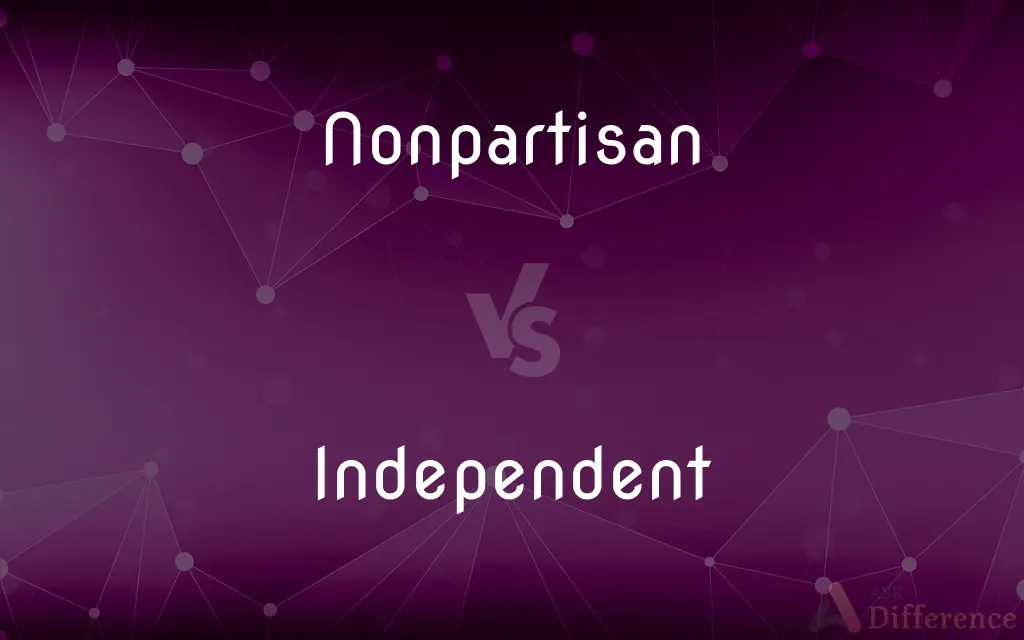Nonpartisan vs. Independent — What's the Difference?
By Fiza Rafique & Urooj Arif — Updated on March 24, 2024
Nonpartisan emphasizes lack of affiliation with political parties, whereas Independent often implies a personal decision not to align with major parties.

Difference Between Nonpartisan and Independent
Table of Contents
ADVERTISEMENT
Key Differences
Nonpartisan entities or individuals do not support any political party, ensuring decisions and views remain unbiased. Whereas, Independent individuals or entities typically choose not to align with the major political parties but may still hold specific political views.
In the context of elections, nonpartisan voting involves choosing candidates or issues regardless of political party affiliation, focusing on policies or qualifications. On the other hand, Independent voters, while not affiliated with major parties, may still lean towards certain party ideologies or candidates based on their independent assessment.
Nonpartisan organizations, such as certain think tanks and civic groups, aim to provide information and advocacy without any party bias, fostering an environment for objective analysis. Independents, whether they are voters or politicians, may still have clear political leanings or ideologies but choose not to formally associate with a party structure.
In legislative contexts, nonpartisan bodies work without party lines, striving for decisions that are based on consensus or broad support rather than party loyalty. Independent legislators, although not tied to a party, might caucus with a party or form coalitions based on issue alignment, maintaining their autonomy while navigating party-dominated environments.
Nonpartisan efforts often aim to bridge divides and encourage dialogue across the political spectrum, promoting unity and collaborative problem-solving. Independent entities or individuals, by asserting their autonomy from parties, often highlight the importance of personal convictions and the value of diverse perspectives in political discourse.
ADVERTISEMENT
Comparison Chart
Definition
Lacks affiliation with any political party.
Chooses not to align with major political parties, despite potential political inclinations.
Focus
Objective analysis and decision-making free from party influence.
Personal or organizational autonomy in political views and decisions.
Common in
Civic organizations, certain electoral processes, and some governmental bodies.
Voters, politicians, and entities prioritizing personal convictions over party loyalty.
Aim
Promote unbiased information, dialogue, and consensus across political divides.
Emphasize individual or organizational freedom and diverse political perspectives.
Political Leaning
Generally avoids any political leaning to maintain objectivity.
May have specific political views or leanings but remains unaffiliated with any party.
Compare with Definitions
Nonpartisan
Involving or characteristic of a neutral stance in political matters.
She delivered a nonpartisan analysis of the proposed legislation.
Independent
Not affiliated with any established political party.
She registered as an Independent to avoid party politics.
Nonpartisan
Not influenced by or supporting any political party.
The nonpartisan committee focused on electoral reform without party bias.
Independent
Exercising a personal choice not to align with major political parties.
As an Independent, he felt free to vote across party lines.
Nonpartisan
Designed to appeal across party lines and ideologies.
The candidate's nonpartisan approach gained him widespread support.
Independent
Marked by a spirit of autonomy in political affiliations.
The Independent candidate's platform was a mix of various political ideologies.
Nonpartisan
Free from political party allegiance in decision-making.
The nonpartisan board made their decisions based on data, not party politics.
Independent
Relating to individuals or entities that prioritize personal convictions.
Independent voters are crucial swing voters in tight elections.
Nonpartisan
Activities or policies not associated with political parties.
The town hall meeting was conducted in a nonpartisan manner.
Independent
Denoting autonomy in political thought and action.
His independent stance on issues often surprised his colleagues.
Nonpartisan
Based on, influenced by, affiliated with, or supporting the interests or policies of no single political party
A nonpartisan commission.
Nonpartisan opinions.
Independent
Not governed by a foreign power; self-governing.
Nonpartisan
Not partisan; impartial and unbiased
Independent
Free from the influence, guidance, or control of another or others; self-reliant
An independent mind.
Nonpartisan
One who is not a partisan.
Independent
Not determined or influenced by someone or something else; not contingent
A decision independent of the outcome of the study.
Nonpartisan
A person who has not selected or declared a side or party.
Independent
Often Independent Affiliated with or loyal to no one political party or organization.
Nonpartisan
Free from party affiliation or bias. Opposite of partisan.
Independent
Not dependent on or affiliated with a larger or controlling entity
An independent food store.
An independent film.
Nonpartisan
Not affiliated with any one party; as, a nonpartisan commission to study crime.
Independent
Not relying on others for support, care, or funds; self-supporting.
Nonpartisan
Free from party affiliation or bias
Independent
Providing or being sufficient income to enable one to live without working
A person of independent means.
Independent
Not dependent on other variables.
Independent
Of or relating to a system of equations no one of which can be derived from another equation in the system.
Independent
Independent Of or relating to the 17th-century English Independents.
Independent
Often Independent One that is independent, especially a voter, officeholder, or political candidate who is not committed to a political party.
Independent
Independent A member of a movement in England in the 17th century advocating the political and religious independence of individual congregations.
Independent
Independent Chiefly British A Congregationalist.
Independent
Not dependent; not contingent or depending on something else; free.
Independent
(politics) Not affiliated with any political party.
The independent candidate
Independent
Providing a comfortable livelihood.
An independent property
Independent
Not subject to bias or influence; self-directing.
A man of an independent mind
Independent
Separate from; exclusive; irrespective.
Independent
A candidate or voter not affiliated with any political party, a freethinker, free of a party platform.
Independent
A neutral or uncommitted person.
Independent
(sports) A team not affiliated with any league or conference.
Independent
Not dependent; free; not subject to control by others; not relying on others; not subordinate; as, few men are wholly independent.
A dry, but independent crust.
Independent
Affording a comfortable livelihood; as, an independent property.
Independent
Not subject to bias or influence; not obsequious; self-directing; as, a man of an independent mind.
Independent
Expressing or indicating the feeling of independence; free; easy; bold; unconstrained; as, an independent air or manner.
Independent
Separate from; exclusive; irrespective.
That obligation in general, under which we conceive ourselves bound to obey a law, independent of those resources which the law provides for its own enforcement.
Independent
Belonging or pertaining to, or holding to the doctrines or methods of, the Independents.
Independent
Not dependent upon another quantity in respect to value or rate of variation; - said of quantities or functions.
Independent
Not bound by party; exercising a free choice in voting with either or any party.
Independent
One who believes that an organized Christian church is complete in itself, competent to self-government, and independent of all ecclesiastical authority.
Independent
One who does not acknowledge an obligation to support a party's candidate under all circumstances; one who exercises liberty in voting.
Independent
A neutral or uncommitted person (especially in politics)
Independent
A writer or artist who sells services to different employers without a long-term contract with any of them
Independent
Free from external control and constraint;
An independent mind
A series of independent judgments
Fiercely independent individualism
An independent republic
Independent
Not dependent on or conditioned by or relative to anything else
Independent
Of political bodies;
An autonomous judiciary
A sovereign state
Independent
Not contingent
Independent
Of a clause; able to stand alone syntactically as a complete sentence;
The main (or independent) clause in a complex sentence has at least a subject and a verb
Independent
Not controlled by a party or interest group
Common Curiosities
Why do some politicians choose to be Independent?
Politicians may choose to be Independent to avoid party constraints, highlighting personal convictions and the ability to vote on issues based on their merits.
Are nonpartisan organizations political?
Nonpartisan organizations engage in political matters but do so without aligning with or supporting any political party, focusing on objective analysis and advocacy.
How do nonpartisan elections work?
In nonpartisan elections, candidates are presented without party labels, and voters choose based on policies or qualifications rather than party affiliation.
Can an organization be both nonpartisan and Independent?
An organization can be nonpartisan by not aligning with parties and Independent by emphasizing autonomy in its political stance and decisions.
How do nonpartisan efforts impact political discourse?
Nonpartisan efforts aim to reduce partisan bias, fostering a more inclusive and objective political dialogue that bridges divides.
Do nonpartisan initiatives contribute to political unity?
Nonpartisan initiatives can contribute to political unity by encouraging dialogue and collaboration across party lines on common issues.
What does nonpartisan mean?
Nonpartisan refers to not supporting or influenced by any political party, ensuring unbiased and objective perspectives.
Can a voter be both Independent and nonpartisan?
Yes, a voter can be both Independent, by not registering with a party, and nonpartisan, by not supporting party-based decisions or candidates.
How does an Independent differ from a nonpartisan?
An Independent actively chooses not to align with major political parties but may have specific political views, whereas nonpartisan implies a neutral stance without any party affiliation or bias.
How do Independents influence policy-making?
Independents can influence policy-making by bringing diverse perspectives and serving as crucial votes in tightly divided legislative bodies.
What advantages do nonpartisan approaches offer in politics?
Nonpartisan approaches offer the advantage of focusing on issues and qualifications over party loyalty, potentially leading to more consensus-based and effective governance.
What role do Independents play in elections?
Independents can be key swing voters, as their votes are not predictable based on party loyalty, often influencing the outcomes of closely contested races.
What challenges do Independent politicians face?
Independent politicians may face challenges in gaining visibility and support without the backing of a major party, alongside navigating a party-dominated legislative environment.
Are nonpartisan bodies common in government?
Yes, there are nonpartisan bodies within governments, especially in certain legislative, judicial, and civic contexts, to ensure unbiased decision-making.
How do voters become Independent?
Voters can become Independent by choosing not to affiliate with any political party, often reflecting a desire for autonomy in their political decisions.
Share Your Discovery

Previous Comparison
Ledger vs. Account
Next Comparison
Obsolete vs. ObeAuthor Spotlight
Written by
Fiza RafiqueFiza Rafique is a skilled content writer at AskDifference.com, where she meticulously refines and enhances written pieces. Drawing from her vast editorial expertise, Fiza ensures clarity, accuracy, and precision in every article. Passionate about language, she continually seeks to elevate the quality of content for readers worldwide.
Co-written by
Urooj ArifUrooj is a skilled content writer at Ask Difference, known for her exceptional ability to simplify complex topics into engaging and informative content. With a passion for research and a flair for clear, concise writing, she consistently delivers articles that resonate with our diverse audience.
















































